Our American Cousin: New Old Theater’s charming ode to another time
There is a line, near the end of the 1858 stage play, Our American Cousin, where the character of the backwoods, Yankee interloper Asa Trenchard, chastises the pompous and manipulative Mrs. Mountchessington, saying, “Don’t know the manners of good society, eh? Well, I guess I know enough to turn you inside out, old gal — you sockdologizing old man-trap.”
That line, it is said, would always bring the house down; with a roar so loud it could even drown out a gunshot.
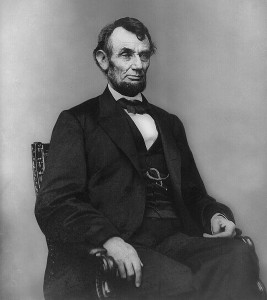
One hundred and fifty years after a fatal bullet felled President Abraham Lincoln, the New Old Theater, in cooperation with the Preservation Society, is presenting Our American Cousin in the courtyard of the Robert Long House in Fells Point.
Directed by Steven Lampredi, Our American Cousin is well recognized as the play Lincoln was watching in Ford’s Theatre the night of April 14, 1865. What is lost on most, however, is the fascinating history of the play which was one of the most popular comedies of the Nineteenth Century.
British actress Laura Keene (who leased her first theatre here in Baltimore) premiered Our American Cousin at her theatre in New York. The play ran in New York for a then incredible 150 performances before moving on to London’s West End, where it would run for 496 performances. Keene originated the leading role of Florence Trenchard and was playing that part at Ford’s Theatre the night the President was assassinated. When it was clear that Lincoln had been wounded, Keene rushed to his box and cradled the president’s head in her lap. The blood-stained cuffs of her dress are on display at the National Museum of American History.
Joseph Jefferson (perhaps the most famous American comic actor of the 19th century) originated the role of Asa Trenchard. Years later, he would become the president of New York’s Players Club after the death of the club’s founding president, Edwin Booth. Edwin, of course, was the brother of Lincoln’s assassin, John Wilkes Booth. It may also be noted that Edwin Booth was once romantically involved with Laura Keene.
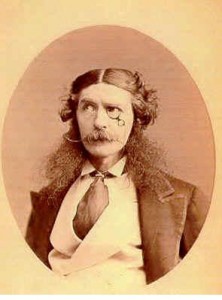
And British actor Edward Sothern, who achieved his greatest fame portraying the play’s clueless English nobleman, Lord Dundreary, is still remembered – not only for the twisted delivery of his character’s lines and wild sideburns which Dundreary sported – but for a conversation with his friend and fellow actor, Joseph Jefferson, before joining the cast .
As the story goes, Sothern, who was already a celebrated thespian in New York and London, was hesitant to take on the role of the feckless Dundreary, fearing the part was simply too insignificant. Airing his thoughts about the role to Jefferson, the comic actor allegedly replied with the now immortal line: “There are no small parts – only small actors.”
With Keene, Jefferson and Sothern at the wheel, Our American Cousin was an unqualified hit. But no definitive text of playwright Tom Taylor’s original work survives because – not unlike a frenzied Marx Brothers farce – the script was modified many times during its early runs by the players, who added or tossed material based on audience response.
For the New Old Theater’s current production, the company drew from many sources to produce what they call a “creative anachronism”.
The action of the play takes place in and around Trenchard Manor, somewhere in the English countryside.
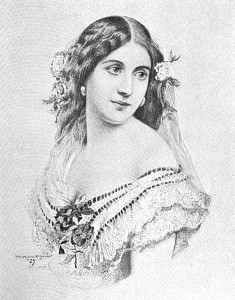
Florence Trenchard receives word from across the pond that her grandfather (who disinherited the family years before) has died and left his estate to a distant Yankee cousin named Asa Trenchard. Asa is soon to arrive in England to claim his inheritance; much to the chagrin of Florence’s father Sir Edward Trenchard, who is about to lose the estate to a crooked steward name Coyle. A subplot includes the machinations of Mrs. Mountchessington, who is determined to marry off her aging daughters to men of means.
Once Asa arrives in a homespun suit, a duel of wits quickly develops between the stuffy Brits and their backwoods American cousin. Mrs. Mountchessington, sensing there is money to be had, connives to push her daughter Augusta off on Asa, while simultaneously trying to deliver daughter Georgina to the clueless Lord Dundreary. Asa pokes fun at Dundreary’s whiskers, saying “They belong under yer chin”, while Mountchessington refers to Asa as a “savage”.
The barbs fly fast and furious throughout the play. And then there are the “Dundrearyisms”; distorted aphorisms such as “Birds of a feather gather no moss”, and riddles like, “Why does a duck go under the water? Diverse reasons.”
The stated goal of the New Old Theatre is, “The study and production of rarely performed 18th and 19th century theatrical time capsules.” This adaptation of Our American Cousin by Buff Huntley and Steven Lampredi fits that charge with plenty of laughs to spare.
Director Lampredi has assembled a delightful cast of proficient players who up the ante from traditional community theatre fare. Particularly pleasing is Mr. Riker in the role of the “savage” Asa Trenchard. Riker’s accent may be hit-or-miss, but his characterization is right on the mark. Equally engaging is Miss Poirier as Mrs. Mountchessington. Anyone who loves watching Pride and Prejudice will find much to enjoy in Poirier’s portrayal.
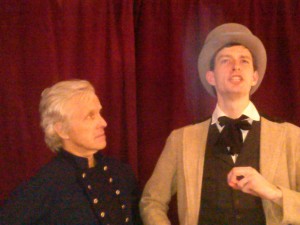
Mr. Knost makes the most of Lord Dundreary’s tangled lines, plus he pairs effortlessly in his comical courting scenes with Georgina – played by the very delicate Miss Neal.
Mr. Lampredi actually elicits audible hisses as the varlet Coyle, while his counterpart Mr. Curtis milks laughs as the repentant Abel Murcott. Speaking of milk, Miss Thomas is a fine flower as Mary Meridith. Miss Deutsch takes a solid turn in the light-hearted role of Florence.
Miss Mack as Augusta, and Mr. Mac Ian as Sir Edward Trenchard fill out the effective cast.
Period music is gamely supplied at the breaks by Miss Mack, Miss Neal and Miss Deutsch.
Lighting for the outdoor production is natural as long as it lasts, then consists of a few floodlights accented by old school candle-lantern footlights. Period costumes were selected by Ider P. Malnevets.
There were a few miscues on opening night and some points where cast members seemed to struggle with lines, but given the farcical nature of the play, everyone just rolled with the punches. One note – it would be helpful if Miss Thomas could project just a little bit more. Remember – the actors are playing in an open courtyard and competing against the sounds of a busy night in Fells Point.
Our American Cousin is an amusing throwback to another time, and a fitting play to produce this week as America remembers the 150th anniversary of the death of Abraham Lincoln. Make a date to have dinner in Fells Point this weekend and then plan on seeing this enjoyable show.
* * * * *
The New Old Theate production of Our American Cousin runs now through this Sunday April 19. Running time is about two hours with one fifteen minute intermission. The play is being staged in the beautiful courtyard of the Robert Long House 812 South Ann Street, Baltimore, MD 21231. Reservations are recommended. More information may be found by visiting the New Old Theater online.

Anthony C. Hayes is an actor, author, raconteur, rapscallion and bon vivant. A one-time newsboy for the Evening Sun and professional presence at the Washington Herald, Tony’s poetry, photography, humor, and prose have also been featured in Smile, Hon, You’re in Baltimore!, Destination Maryland, Magic Octopus Magazine, Los Angeles Post-Examiner, Voice of Baltimore, SmartCEO, Alvarez Fiction, and Tales of Blood and Roses. If you notice that his work has been purloined, please let him know. As the Good Book says, “Thou shalt not steal.”

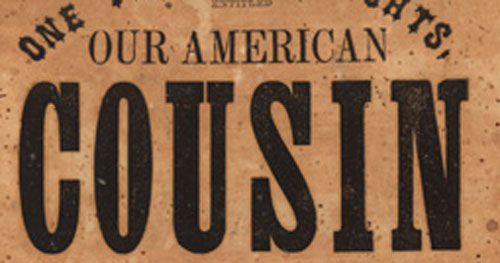
God knows how many send-ups of this basic story have been produced over the past 150 years. Clearly “Our American Cousin” was the inspiration for “The Beverly Hillbilies,” for example. Which only serves to proved that an entertaining story is timeless.